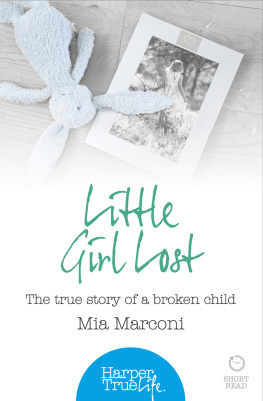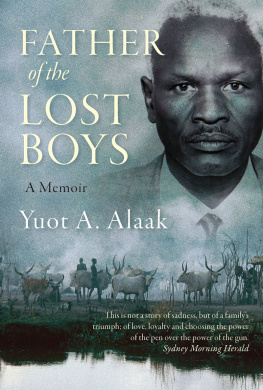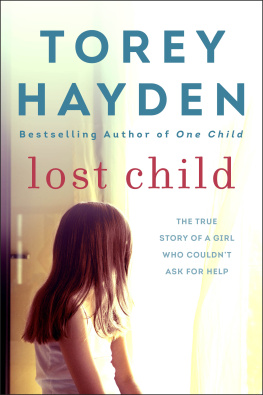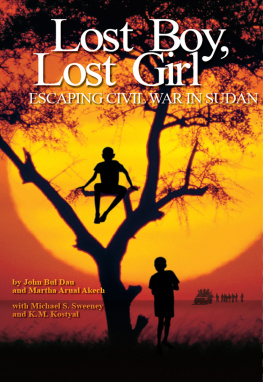Dinka contains many loanwords from Arabic, due to the countrys past. There are six different dialects of Dinka that have different spellings and grammar. Most Dinka, and especially most former refugees, speak a combination of these dialects, and may include words from Swahili, Arabic, and English in everyday speech. There may also be words in common with Nuer. Ive tried to italicize words that are not found or typically used in the English languagethey may have their origin in a wide array of different languages spoken in South Sudan. Its possible that no authoritative source fully captures the vocabulary and grammar used by the South Sudanese diaspora.
Rebeccas story brings the real-life experiences of a courageous refugee to life. The beauty of her homeland, the heartache of loss, the trauma of abuse and war, and the joy of new beginnings. I pray that Rebeccas story will help all of us understand in new ways the plight of the sixty-five million refugees around the world, and how Gods loveand Gods Word of hopecan transform lives for His glory.
Dr. Roy L. Peterson, president and CEO of American Bible Society
When you meet the vibrant, joy-filled, and engaging Rebecca Deng, youd never know the horrors of what she had to deal with and overcome at such a young age. Surviving in a war-torn country, traveling over miles of rough terrainoften by footto get to what she believed would be safety, only to discover more tragedy. But through it all, Rebecca found a strength and bravery to combat the worst levels of trauma and come out victorious, healthy, and whole. In WHAT THEY MEANT FOR EVIL, Rebecca shares a page-turning account of the raw realities of evil but also the overcoming power of faith and bravery. This is a must-read for anyone who wants to make a real difference in the world.
Kirk Cousins, NFL quarterback for the Minnesota Vikings
Anyone who wants to understand Khartoums systematic campaign of genocide, which led to two million deaths in South Sudanand which continues today to claim countless innocent livesneeds to read Rebecca Dengs story. It is a powerful indictment of a regime that has ruthlessly crucified its Christian people, but it is also a moving and inspiring story of the triumph, in one exceptional life, of love over hate, life over death. Its a story that deserves to be widely known.
Lord David Alton, former Liberal Democrat Member of Parliament, permanent member of the House of Lords, and cofounder of Chance for Childhood
In WHAT THEY MEANT FOR EVIL, Deng paints a vivid portrait of her idyllic childhood in a village in South Sudan until her innocence is stolen on a rainy day when soldiers attack her home. The fact that Deng survived her ordeal is, in itself, nothing short of a miracle. That she went on to become an international speaker, author, and vocal advocate for women and children is a testament to her strength of character and faithfulness to Gods call. This book is beautifully written and deeply moving. [For me] as president of the Lutheran Immigration and Refugee Service, Dengs incredible story of hope, perseverance, healing, and faith is a very personal reminder of why we are called upon to do this work.
Linda Hartke, president and CEO of Lutheran Immigration and Refugee Service
In her stunning memoir WHAT THEY MEANT FOR EVIL, Rebecca Deng tells the story that needs to be heard. Until there is no more war, all stories of war are important. But all too seldom do we hear from the innocents, the collateral damage, the women and the children. Rebecca lost her home and family to violence in South Sudan as a small child, but she faced the struggles of a young woman unprotected in the refugee camp. One of only a handful of Lost Girls, she came to America and made an amazing life for herself and her family. Her strength and spirit shine through. Rebeccas is a voice we need to hear.
Judy A. Bernstein, coauthor of They Poured Fire On Us From the Sky: The True Story of Three Lost Boys of Sudan
This heart-touching story of Rebecca Deng isnt just another reflection of what happened and is still going on in South Sudan. When reading her story it is like being present at the scene. More than once I found it breathtaking and more than ever before I was motivated to work hard to restore or finally establish peace in South Sudan. A must-read for everyone interested in the reality of what happens in the life of innocent people facing war.
Henk F. Koppelaar, CEO of Quintessence, an independent Dutch consultancy for charities and NGOs
Do not go through this book; let it go through you!
You will understand the devastating impact of war and conflict through the raw, authentic voice of a little girl on the run. A little girl growing up in a crowded, poverty-stricken refugee camp, a fifteen-year-old girl forced into motherhood. In her struggles with premature motherhood you will encounter the foster family and the community that welcomed her in Holland, Michigan, and who shaped who she is today.
Rebeccas story peels the linguistic camouflage used by governments and the media to hide the horrible and brutal impact of war on children. In a world where refugees are a lucrative fund-raising cause, Rebecca is the human being the many fund-raisers appeals refer to only as nameless refugee children, statistics, and percentages.
While conventional language defines refugee children as broken and helpless, this is a story of one such child who, with inner strength and support from those who chose to care about her, refuses to allow the brokenness to define her future.
Rebecca refuses to be the Lost Girl of South Sudan, as the lucky few refugee children from her war-torn country were introduced to America. Rebecca is not the Lost Girl of South Sudanshe is alive and engaged through her story in this book. She defies the helpless victimhood label; she is a thriving overcomer.
Jane Wathome, director of Global Scripture Impact at American Bible Society
No life is lived without hardship. Most of us seek pleasure, not pain, even though we know the travails of life are what test us, build character, create new paths of resiliency, and make it possible to savor the joys and blessings of friendship and family. Rebecca Dengs story is our story. It is about the journey of humanity toward the greater good, a journey that can only happen when each of us makes it happen in our own lives.
Jonathan C. Lewis, author of The Unfinished Social Entrepreneur
Rebecca Deng and Ginger Kolbaba tell an inspiring story of loss, resilience, and faith. The story is based on real-life events of Rebecca Deng during the second Sudanese civil war. In the blaze of destruction and death, Deng was left without a home and her immediate family. Losing the life she knew at the young age of six, her situation propelled her to grow up and keep moving forward. She experienced severe depression and had difficulty coping with her life. Deng looked to faith and education as escape from the horrors of the war and the refugee camps. Her life truly changed when she was granted refugee status in the United States, which gave her the opportunity to begin a new life, study, and become an advocate for peace and change. Deng embodies strength and hope that resounds with the reader in her thrilling story of a lost child from a war-torn country.
Goran Debelnogich, senior principal analyst, US Department of Health and Human Services
With a clear, beautiful, faith-filled voice, Rebecca Deng tells an important and gripping story. Most of us in the West cannot comprehend how life could change so quickly from one of innocence and peace and abundance to such raging evil. But in the life of this former Lost Girl, we see a testimony to the strength and resilience of the people of South Sudan and how they overcameand continue to overcomeoverwhelming challenges and sorrows in their determination to be the country that God created them to be.







